- New Khuner Adventure: Opera to Nepal
- Sara Jobin and the B Minor Mass Peace Project>
- S.F. Choral Society to Fill Summer Silence in a Big Way
- S.F. Symphony’s Starry Nights
- Island City Opera Flips Poster and Repertory>
- In Brief: Composer-in-Residence Applications Invited; One Found Sound Season; Fremont Youth Symphony Organized
New Khuner Adventure: Opera to Nepal

The global omnipresence of Jonathan Khuner is about to stretch all the way up into the Himalayas. The West Edge Opera music director (conducting this month a run of Janacek’s The Cunning Little Vixen) has 65 Berkeley productions under his belt, has been an assistant conductor at the San Francisco Opera for over 30 years, at the Metropolitan Opera in New York for over 15, and has served as well on the musical staff of Chicago's Lyric Opera since 1992. In 2013, he conducted the first Wagner opera ever performed in Albania: Tannhäuser, at the National Theater in Tirana. He has worked everywhere, from Bayreuth to Israel, from the Santa Fe Opera to the Miami Opera, and much more.
And now, to Nepal. Khuner will conduct Douglas Cuomo’s Arjuna’s Dilemma, Sept. 2-11, in Kathmandu's Bhitri Chowk courtyard of the Patan Durbar Square Royal Palace. Singers Roy Stevens and Annalisa Winberg are co-producing and performing. The opera was first premiered at the BAM Next Wave Festival in 2008. It will be performed in concert by Dallas Opera in May 2017 as part of the Opera America annual conference, conducted by Nicole Paiement. also of San Francisco’s Opera Parallèle.
Rehearsals are already under way in Kathmandu for the acting ensemble. Conceived as a “gift for the soul of Nepal” in the aftermath of last year’s devastating earthquakes, the opera was composed as a collaboration between Cuomo and Amit Chatterjee, and incorporates elements of Western classical music, improvisational jazz, and Indian classical music.
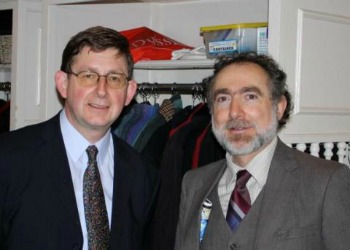
Prior to the artists’ departure for Nepal, two benefit concerts were scheduled: last week in the Central Valley, and tonight (Aug. 2) at 7:30 p.m. at the Berkeley Arts Festival. Participants include Khuner, Stevens, Winberg, George Brooks on saxophone, and Rohit & Ren (a Nepali acoustic duo).
Ticket proceeds will be donated to a program that provides musical instruments and training for street children in Nepal, an initiative of the Kathmandu Jazz Conservatory. “Following the devastating twin earthquakes,” Khuner says, “thousands of village children were sent to Kathmandu, becoming easy prey for human trafficking and organ sales. Kathmandu Jazz Conservatory is striving to give these at-risk children skills and a livelihood.”
The production will also provide employment for dozens of artists, actors, dancers, singers, artisans, and technicians in Nepal. Tax-deductible contributions towards these philanthropic efforts may be made by sending checks to the coordinating charity (a 501c3 organization) Fiscal Agent for One World Theatre, c/o Bev Hoffman, Children of Peace, Inc, 1717 Hopkins St., Berkeley, CA 94707.
Sara Jobin and the B Minor Mass Peace Project
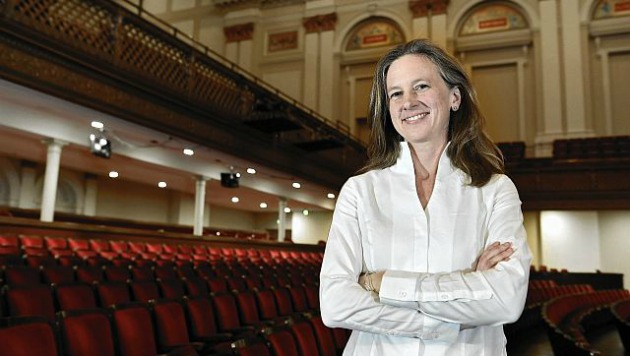
Conductor Sara Jobin, who has important - even historical - links with San Francisco (where she became the first woman to lead performances in the War Memorial Opera House), is very much in the news these days.
Having served as interim resident conductor of the Toledo Symphony in Ohio, Jobin has just been named to the position permanently; she is also associate conductor of the Toledo Opera, and serves as chief conductor of the Center for Contemporary Opera in New York. Conducting concerts and opera in many countries, Jobin’s focus now is on her participation in the international B Minor Mass Peace Project 2016.
Jobin will conduct the Mass on Aug. 13 in Toledo, part of a 24-hour Bach-Around-the-Clock Festival, a collaboration between the Toledo Symphony and Toledo Art Museum. Performers include members of the Toledo Symphony, regional area choruses, and soloists.
Jobin and the Peace Project will travel on Sept. 13 to the Carmelite Convent Heilige Blut just outside the walls of the Dachau concentration camp. Performances in Jerusalem on Dec. 28, in Bethlehem the next day, and in Nazareth on Jan. 1 will be headed by Maarten Ophiel van Leer.
The project – “combining the uplifting effect of Bach’s B Minor Mass with prayers for peace from different spiritual traditions” – was initiated by the Sufist spiritual teacher Pir Vilayat Inayat Khan (1916-2004), son of Hazrat Inayat Khan, founder of the Sufi Order, now known as the Inayati Order. After establishing the peace project, one of the first Bach performances was given at Dachau, back in 1996. The upcoming Jerusalem event will mark the centennial of Vilayat Khan’s birth.
The 2016 Dachau concert is in memory of Noorunisa Inayat Khan, the Sufi master’s sister, who was a harp player, studied with Nadia Boulanger, became a British spy in World War II, was captured by the Nazis in France, was tortured (but did not reveal information), and died in Dachau in 1944.
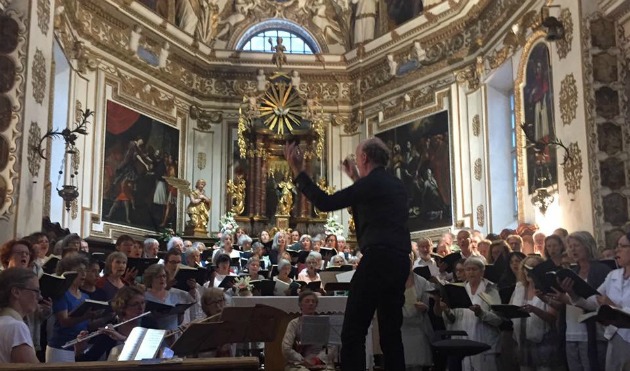
Jobin participated in a B Minor Mass performance in Switzerland last Friday, conducted by van Leer. The “orchestra” was Jobin on the piano, plus a violin, a cello, and two flutes. The chorus of 90 used the occasion to prepare for the performances in Israel, and some of the chorus members will also be with Jobin at Dachau.
S.F. Choral Society to Fill Summer Silence in a Big Way
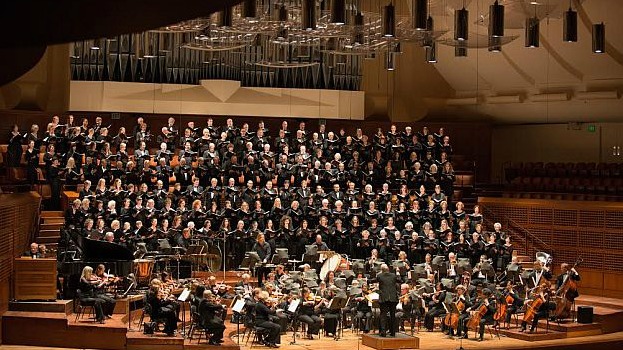
During the August hiatus of both the San Francisco Opera and Symphony, the S.F. Choral Society will fill the Davies Symphony Hall with Verdi's mighty Requiem.
The 200-voice chorus, 60-piece California Chamber Symphony. and soloists Hope Briggs, Edith Dowd, Noah Stewart, and Eugene Brancoveanu will be conducted by Robert Geary in performances on Aug. 19 and 20 at 8 p.m. (Aspirants to Civic Center parking, beware: Aug. 20 is also the Merola Grand Finale in the Opera House.)
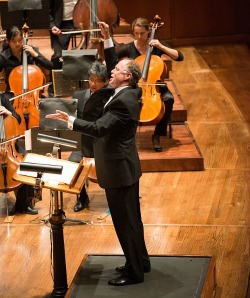
Verdi wrote the Requiem following the death of two men he revered, composer Gioacchino Rossini and novelist/Italian independence champion Alessadro Manzoni. The composer conducted the premiere in 1874 in Milan’s Church of San Marco. From the Choral Society program:
<blockquote>The Requiem opens with grief-laden voices. Two large sections dominate the structure of the Requiem: the nine parts of the “Dies irae” (Day of Wrath) and concluding with the” Libera me.” The “Dies irae” is based on a medieval poem where the sinner asks for salvation. The trumpet scatters a marvelous sound (“Tuba mirum spargens sonum”) combined with “Mors stupebit et natura” (Death and nature will stand aghast) signifies Judgment Day.
Throughout the piece there are moments and movements that are chilling and brilliant. The “Rex tremendae” sung with menace by the choral bass section and the repetitions of the “Salva me” with the combined forces of soloists and chorus are an example. The thrilling “Sanctus” beginning with a double fugue, is the most extended and cheerful music. The last movement, “Libera me” is stunning, although hushed and painful.</blockquote>
S.F. Symphony’s Starry Nights
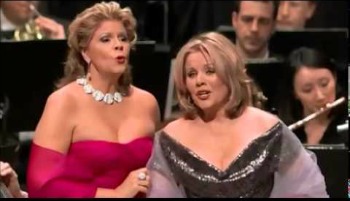
The San Francisco Symphony's new season – it’s its 105th – is only a month away, and looking through the fall calendar, the presence of stars is prominent.
Right at the beginning, on the Sept. 7 opening night, two great opera singers will be featured: soprano Renée Fleming and mezzo Susan Graham. They will sing arias and duets on a program led by SFS Music Director Michael Tilson Thomas. The celebration of Steve Reich on his 80th birthday will begin at the opening gala with a performance of his Three Movements.
Another opera star, tenor Michael Fabiano – whose performance in the title role of Verdi’s Don Carlo last month received critical raves – will sing Italian arias at the Sept. 22-24 subscription concerts. Also on the program: Verdi’s Te Deum (the composer wanted to be buried with the score, it is said), oboist Eugene Izotov featured in Baroque composer Alessandro Marcello’s popular concerto ... and the Swingle Singers making their debut in Luciano Berio’s Sinfonia.
Yuja Wang will be featured in the Shostakovich Piano Concerto No. 1, Sept. 28-Oct. 1; Chopin’s Piano Concerto No. 2, Nov. 2-4; and then headline concerts once again on the Symphony's tour of Asia, Nov. 9-22.
Two distinguished conductors on the fall program will be Gustavo Dudamel with his L.A. Philharmonic on Oct. 31 and Nov. 1; and Simon Rattle leading the Berlin Philharmonic, Nov. 22-23, in a varied program of works by Boulez, Mahler, Schoenberg, Webern, Berg, and Brahms.
Island City Opera Flips Poster and Repertory
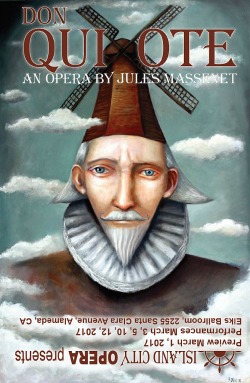
Having text and art going different ways on the poster for Island City Opera’s production of Massenet’s Don Quixote mirrors a newborn company’s daring in its third season, getting away from the usual warhorses.
Small companies, especially young ones, usually rely on proven audience favorites to fill seats. Don Quixote (Don Quichotte) is not a warhorse; it was popular only for a while in Europe a century ago, and only when Feodor Chaliapin sang the title role. It’s too bad because the opera has some of Massenet’s most substantial music, almost on par with the much more performed Manon and Werther.
The five-act (but only two-hour-long) comédie-héroïque premiered in 1910, with Chaliapin. (Massenet, who wrote the opera while ill, died less than two years later.) Chaliapin, as the Woebegone Knight, also triumphed in the 1933 film, with music by Jacques Ibert. There was a bit of a scandal when Maurice Ravel, Marcel Delannoy, Manuel de Falla, and Darius Milhaud were also asked to write songs for Chaliapin, but each composer was made to think only he had been approached.
Island City Opera’s home in the Alameda Elks Lodge Ballroom will be the venue for performances of Don Q on March 3, 5, 10, and 12. It is produced by company founder/ board chair Eileen Meredith, directed by Igor Vieira, and conducted by Philip Kuttner. Bill Pickersgill sings the title role, Buffy Baggott is Dulcinée, and Vieira is Sancho Panza.
The company's season opens with another Don – Don Pasquale by Donizetti, in the Elks Lodge on Jan. 20, 22, 27, and 29. Meredith is producing, Erin Neff is stage director, Kuttner conducts. The title role is sung by Bojan Knezevic, Meredith is Norina, Sergio Gonzalez is Ernesto, Vieira sings Malatesta.
Back to the poster, Island City Opera board member Robert Boyd, who designed it, explains:
<blockquote>It started out as a postcard. Imagine that you hand someone the postcard. They naturally turn it so that the face is right-side up. They read “Don Quixote” at the top. Then they notice that the date and location are written at the bottom, upside down. So, they spin the card around, read the date and location.
But, the upside-down face is a bit disconcerting. So, then, they spin it around again. And, what does all that spinning remind you of? The windmill vane, of course. The first person I handed it to spun the card around a couple times and then said, ‘Oh, someone has over-thought this.’ I think people get the joke pretty quickly.</blockquote>
In Brief: Composer-in-Residence Applications Invited; One Found Sound Season; Fremont Youth Symphony Organized
Composer-in-Residence Applications Invited
California Symphony and Music Director Donato Cabrera are now accepting composer applications for the orchestra’s respected, intensely competitive Young American Composer-in-Residence program, for the period from Aug. 1, 2017 through July 31, 2020.
The program, conceived and launched in 1991 by former Music Director Barry Jekowsky, gives young American composers an opportunity to write orchestral music while working with a professional orchestra and conductor, over a three-year period. Among former participants: Mason Bates, Kevin Puts (whose residency piece Network will open the California Symphony’s new season), Pierre Jalbert.
One Found Sound Season
One Found Sound, a San Francisco-based chamber orchestra, founded three years ago, has announced its program for the 2016- 2017 season. Concerts will include works by Bohuslav Martinů, Aaron Copland, Ottorino Respighi, Zoltán Kodály, and many others composers.
The chamber orchestra features a repertoire selected by its members and showcases the creativity of each individual musician. All performances by One Found Sound, which plays without a conductor, are held in intimate and eclectic art spaces, striving to give audiences an engaging and personal experience with the music and musicians.
Fremont Youth Symphony Organized
The newly created Fremont Youth Symphony Orchestra is inviting applications for the 2016-17 academic year. Membership and placement is by audition, headed by the new organization’s artistic director, Judy Lam. The orchestra will include 6th through 12th graders, who are currently enrolled in private music instruction in strings, brass, woodwinds, and percussion.
Weekly rehearsals will be on Mondays from 4 to 7 p.m., beginning on Sept. 12, in Cole Hall of the First United Methodist Church, 2950 Washington Blvd., in Fremont.
The orchestra will be comprised initially of two ensembles – intermediate and advanced – tailored to specific skill levels. Students will receive individualized support from the directors and sectional coaches. The quality training will help students develop strong musicianship and performance technique for orchestral playing. For information about program details and cost, email youth@fremontsymphony.org.

